Book contents
- Frontmatter
- Contents
- Preface and acknowledgements
- List of abbreviations
- 1 Moral moments
- 2 The neurotic and the penitent
- 3 True, false, and feigned penance
- 4 Fame without conscience
- 5 Cain and conscience
- 6 Feminine paradoxes
- 7 Sincere hypocrisy
- 8 The poetical conscience
- Envoi: Spiritual sophistry
- Bibliography
- Index of quotations
- General index
- CAMBRIDGE STUDIES IN MEDIEVAL LITERATURE
7 - Sincere hypocrisy
Published online by Cambridge University Press: 30 September 2009
- Frontmatter
- Contents
- Preface and acknowledgements
- List of abbreviations
- 1 Moral moments
- 2 The neurotic and the penitent
- 3 True, false, and feigned penance
- 4 Fame without conscience
- 5 Cain and conscience
- 6 Feminine paradoxes
- 7 Sincere hypocrisy
- 8 The poetical conscience
- Envoi: Spiritual sophistry
- Bibliography
- Index of quotations
- General index
- CAMBRIDGE STUDIES IN MEDIEVAL LITERATURE
Summary
Rational and reflective yet hardly capable of accounting for the will to choose evil, Abelard's conscience resembles an impartial arbiter. Heloise's is more like an implacable prosecutor, bent on incriminating herself. Not content with self-accusation, she goes on to address the issues, both personal and theoretical, raised by penance. And it is in dealing with these issues, in her second letter, that Heloise develops some of her subtlest paradoxes, among them sincere hypocrisy. She declares that she wishes to do penance for Abelard's sufferings. What does that mean? If the lifelong contrition which she imagines inflicting on herself is identical to a classic definition of monasticism quoted by Abelard, there end her resemblances to him and to virtually every other writer on the doctrine of penance. They taught that contritio should be directed to God. Not so Heloise. Impenitent towards Him, whom she accuses of ‘extreme cruelty’, she criticises divine justice and denies hope in divine mercy.
Too little attention has been paid to this statement, which none of her contemporaries would have taken lightly; too much to her erotic fantasies during mass, which at least some of them were inclined to regard more indulgently. No indulgence was possible for the sin of blasphemy against the Holy Spirit which Heloise commits in defiance and despair.
- Type
- Chapter
- Information
- Paradoxes of Conscience in the High Middle AgesAbelard, Heloise and the Archpoet, pp. 138 - 164Publisher: Cambridge University PressPrint publication year: 2009



